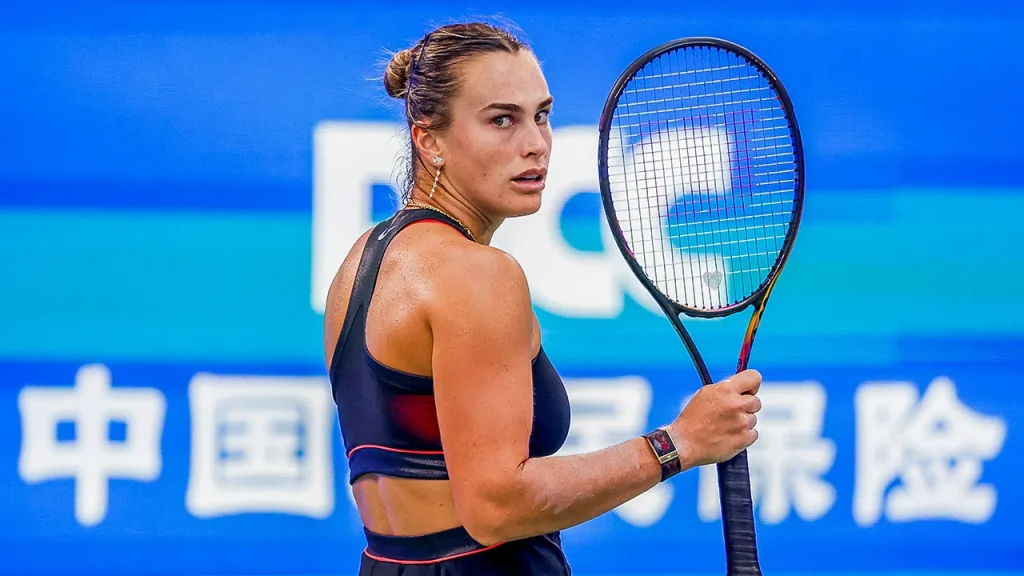World No. 1 Aryna Sabalenka’s Outburst Nearly Hits Ballboy During Semifinal Loss
Frustration got the better of world No. 1 Aryna Sabalenka during a tense semifinal match against American Jessica Pegula at the Wuhan Open in China. In a moment of anger after sending a backhand out of bounds, Sabalenka threw her tennis racket across the court, narrowly missing a ballboy stationed near the umpire’s chair. The incident occurred at a critical juncture in the match, with the third set tied 5-5 after Sabalenka had surrendered a three-game lead. Though she quickly raised her hand in acknowledgment of her mistake—likely attempting to throw the racket toward her bench rather than in the direction of the official—the action earned her a warning from the umpire and sharp criticism from the Sky Sports broadcasting team, who noted that she was “lucky it is not more” than just a warning. The outburst seemed to mark a turning point in the match, as Sabalenka went on to lose the following game and eventually fell to Pegula in a third-set tiebreak, with final scores of 2-6, 6-4, 7-6 (7-2).
This display of temper isn’t unprecedented for Sabalenka, who has a history of emotional reactions during matches. What struck some observers, however, was the relatively mild official response to an action that could have resulted in injury. Some tennis fans on social media questioned the apparent double standard in enforcement, with one X user writing: “How did Sabalenka not get a warning for throwing her racquet? She almost hit a ball kid too, could have been a disqualification. [Iga] Swiatek would have been burnt at the stake for this.” The comment highlights the ongoing debate about consistency in how code violations are applied across different players in professional tennis, especially when safety is at risk.
The semifinal defeat came as something of a disappointment for Sabalenka, who entered the tournament riding high after successfully defending her U.S. Open title just weeks earlier. The Belarusian star has had a remarkably consistent 2023 season at Grand Slam events, collecting her fourth major title at the U.S. Open after reaching the finals at both the Australian and French Opens and advancing to the semifinals at Wimbledon. This consistency has helped cement her position at the top of the women’s rankings, despite occasional struggles with controlling her emotions during high-pressure situations.
For Pegula, the victory represented another breakthrough in what has been a steady climb through the women’s tennis hierarchy. The American’s composed performance against the world’s top-ranked player demonstrated her growing confidence and tactical acumen in crucial moments. Pegula advanced to face compatriot Coco Gauff in an all-American final at the Wuhan Open, though she ultimately fell short in straight sets, 6-4, 7-5. The Pegula-Gauff final highlighted the current strength of American women’s tennis, with two top players competing for a prestigious title on the international stage.
The incident with Sabalenka raises broader questions about player conduct and safety protocols in tennis. While displays of frustration—including racket abuse—have long been part of the sport’s emotional landscape, there’s an important line between expressing disappointment and creating dangerous situations for others on court. Tournament officials, players, and coaches continue to navigate this balance, understanding that while tennis is an intensely personal and emotional sport, the safety of everyone involved must remain paramount. Sabalenka’s near-miss with the ballboy serves as a reminder of the potential consequences of unchecked emotions during competition.
As Sabalenka moves forward from this incident, she faces the challenge many top athletes encounter: how to harness the passion that drives excellence while maintaining the composure needed for consistent success. Her 2023 season reflects this duality—remarkable achievements at the sport’s highest level alongside moments where emotions temporarily overwhelm judgment. For a player with Sabalenka’s tremendous power and skill, continued growth in emotional management could be the key to even greater dominance in women’s tennis. Meanwhile, fans and officials alike will be watching closely to see how she responds to this setback in upcoming tournaments, as she works to maintain her position at the pinnacle of the sport while addressing the aspects of her game—both technical and temperamental—that still present occasional challenges.


